Our Stay at Kings Camp Safari Lodge Timbavati Reserve South Africa.
Arrival:
The manager picked us up from Hoedspruit airport and drove us the 40 km to Kings Camp Safari Lodge in the centre of the Timbavati game reserve. The camp reminded me of the movie Out of Africa, with a dining room overlooking a small waterhole frequented by buffalo and elephant, and thatched roofed chalets outfitted with exquisite period furniture. The general ambiance and the top quality meals completed the canvas of a classical African 19th century bush experience.
Our Stay:
We stayed 5 nights and had a private vehicle to ourselves. This allowed us to have 4 hour morning and afternoon game drives of our own choosing and be able to stop for extended times when we saw something of interest. This contrasted with the normal Timbavati Safari vehicle which had 6 persons per vehicle and the itinerary determined by consensus. At the extreme end we saw safari vehicles completely filled with 9 visitors seated 3 abreast; those in the centre hardly able to turn around.
During our stay we had two unexpected bonuses: a wonderful bush breakfast under a stand of shade trees, and a buffet dinner in an open air Boma under the stars where local villagers put on a dramatic, energetic cultural dance exhibition.
The Wildlife:
The area is mainly scrub with sandy dried up river beds. By the end of August, most of the bushes have dropped their leaves leaving the land stressed but allowing clear sighting of the game. In general the animals were scarce, with few sightings per drive, but on one occasion we saw a large herd of elephants remain a long time at a waterhole drinking, socializing, fighting and generally mucking around.
These elephants often came very close to our vehicle. In fact they were the closest encounters I have ever experienced; some just feet away, but there was no aggression and we felt no fear. We also witnessed a very large herd of buffalo at a waterhole right near sunset, but as the sun approached the horizon as a red ball, something freaked out the herd and they all disappeared in seconds just as I was about to capture a great photograph. Another great moment was witnessing two male giraffe necking, i.e. hacking into each other. I’ve seen this on Attenborough television, but this was the first time in 30 years that we saw it for ourselves. Finally, there were the rhinos. On our last drive at 5 am we were leaving the camp when the guide asked what we wanted to see. I wanted to say leopards, but Dahlia replied rhinos, and to every ones’ surprise two rhinos materialized out of the darkness just a short distance away illuminated by the rising full moon. Later I found out that rhinos under a full moon are a major event in Timbavati, as this is the time poachers hunt rhino for their horn. So Timbavati park rangers fear the full moon wondering how many rhinos will die during the night, recalling that 400 rhinos were poached last year in the Timbavati.
The area around Kings camp is prime leopard country, but we only saw 3 leopards briefly during our stay.
Finally a comment about game viewing conditions:
Timbavati is a 65,000-hectare game reserve, divided into a number of private concessions (originally farms) each with an area of around 14000 hectares (140 square kilometres). Most of these farms have allowed a private safari camp to be managed on their concession. Most of these Safari camps have bilateral arrangements with their neighbouring lodges for transiting rights, These vary, from no transiting rights to one or more vehicles per neighbouring camp on their territory at any given time.


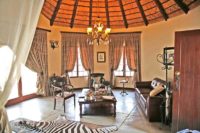
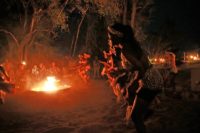
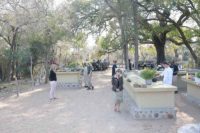
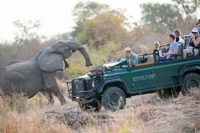
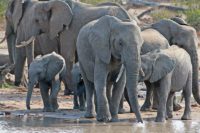
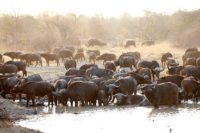
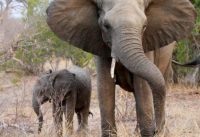
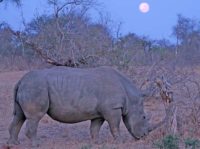
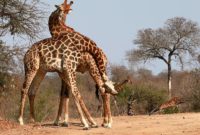
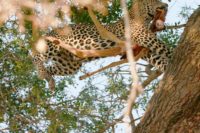
Sorry, the comment form is closed at this time.